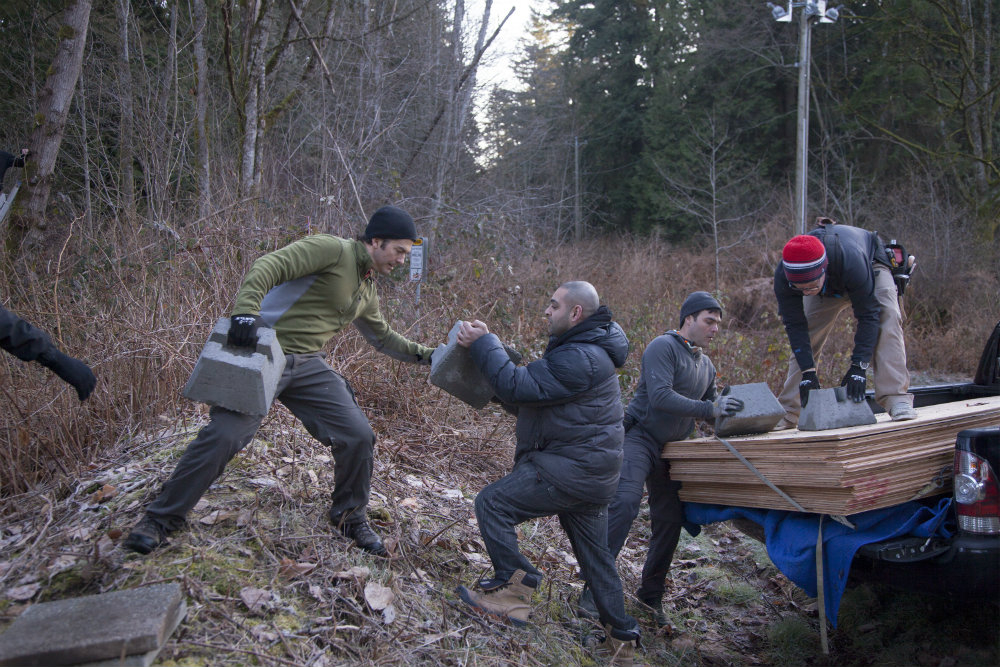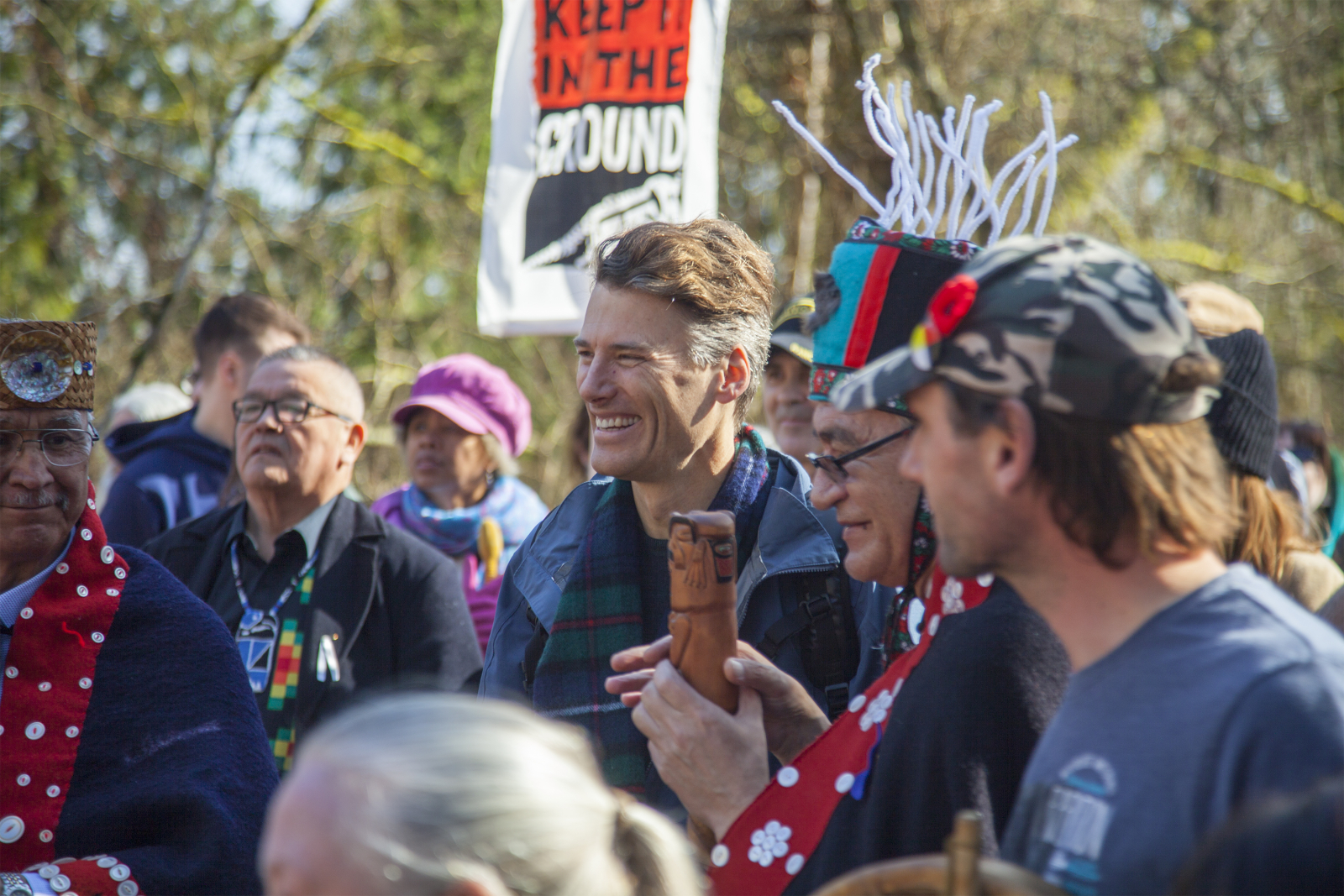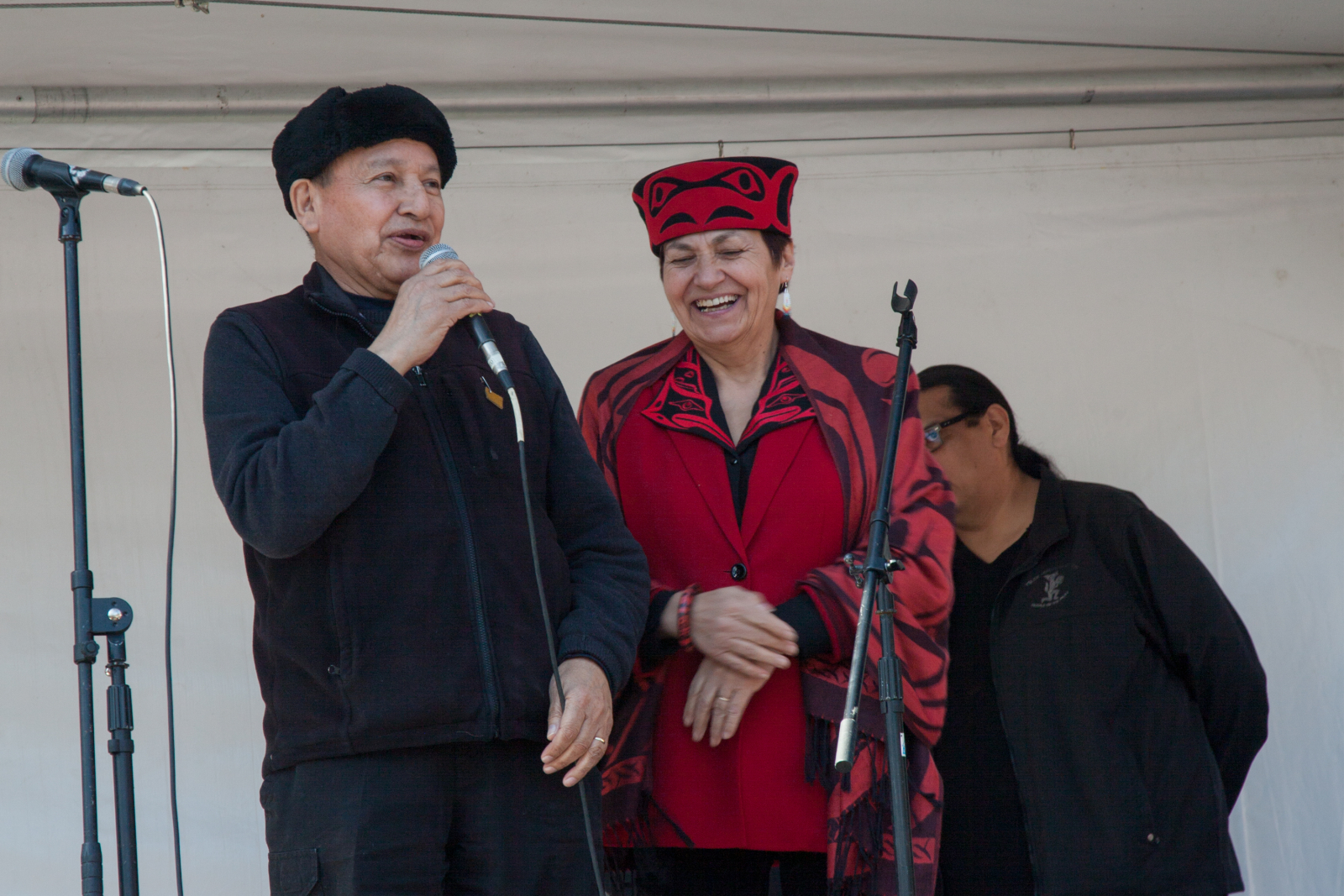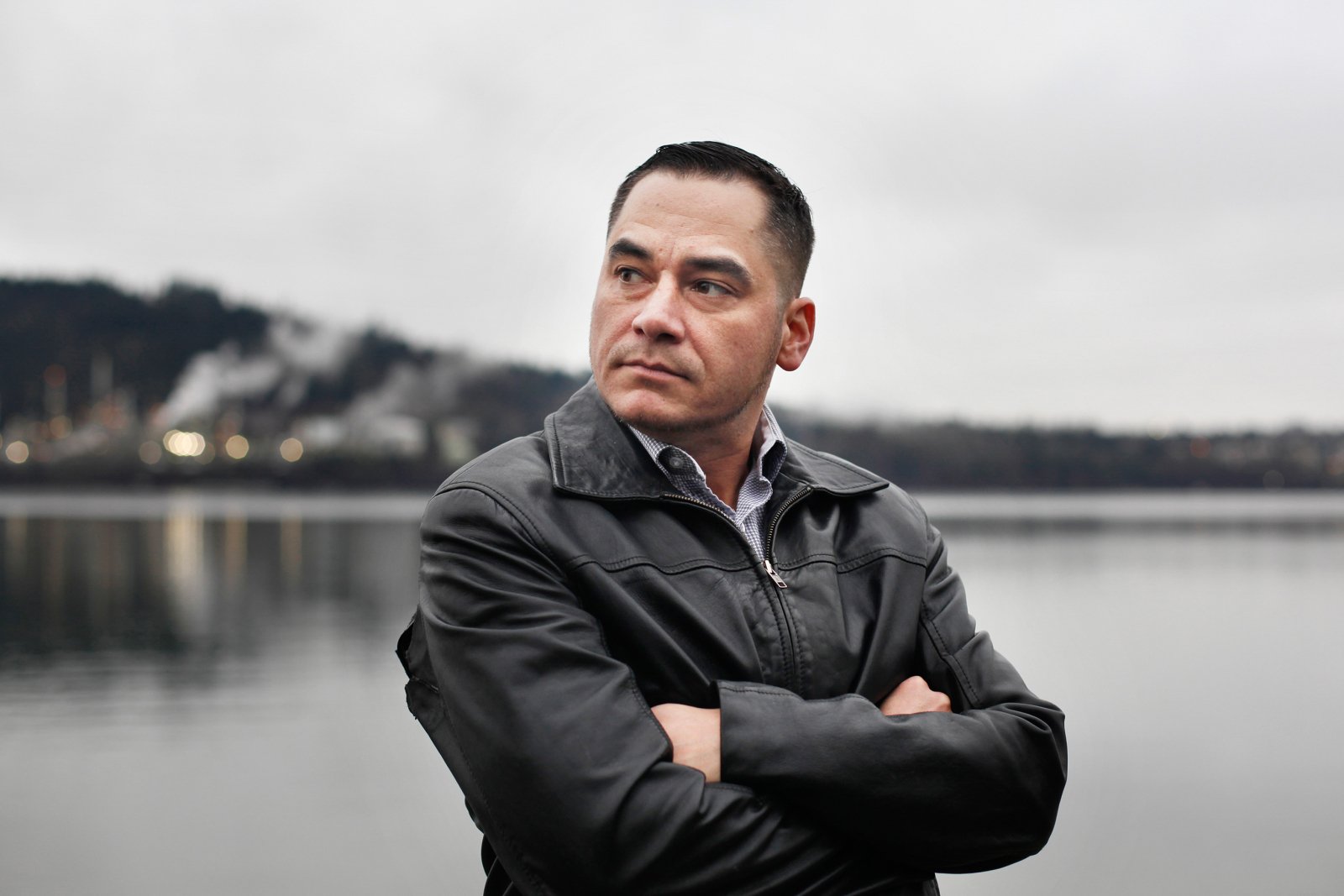Articles Menu

The air was crisp and cold as they trekked up Burnaby Mountain early on Saturday morning. People's breath came out in white puffs as each of the volunteer construction workers carried two planks of wood. Their goal was to build a traditional Indigenous "watch house" to monitor Texas-based Kinder Morgan as it proceeds with construction of its Trans Mountain pipeline expansion project.
The $7.4-billion project was approved by Prime Minister Justin Trudeau's government in November 2016 and subsequently challenged in court by First Nations, the City of Burnaby, the City of Vancouver and the B.C. government.

In Burnaby, the volunteers chose a spot on public land where the B.C. Supreme Court has temporarily drawn a line in the sand through an injunction granted to Kinder Morgan on Friday that set a 50-metre 'exclusion zone' to keep protesters away.
Building the watch house was the first act. By 10 a.m. several thousand people converged to follow Indigenous leaders from across North America in a demonstration that began at the Lake City Way Skytrain station in Burnaby.
Thousands gathered in Burnaby on March 10, 2018, to protest against the proposed Kinder Morgan pipeline expansion. Grand Chief Stewart Phillip of the Union of B.C. Indian Chief and Grand Chief Serge Simon of Mohawk Council of Kanesatake gave their views about the proposed oil pipeline expansion.

The Trans Mountain expansion has been at the heart of an intensifying conflict between the two NDP governments in B.C. and Alberta since early 2018. The B.C. government is formally opposed to the project, while the Alberta government has threatened B.C. with boycotts and a cutoff to its oil supply if doesn't stop trying to scuttle the pipeline. But densely populated parts of B.C., including the City of Vancouver and the City of Burnaby, have been opposed to the project for years due to the increased risk of an oil spill along the coast.


Prime Minister Trudeau told National Observer in an interview last month that the project was a compromise needed to proceed with a national climate change plan and has accused B.C. Premier John Horgan of trying to undermine that objective through his opposition.
A few hours after the rally against Kinder Morgan's project began in Burnaby, about 200 proponents assembled at the Jack Poole Plaza in downtown Vancouver to show support for the pipeline expansion. Speakers included BC Liberal MLA Ellis Ross, a former Haisla Nation Councillor who now serves as Official Opposition Critic for Natural Gas and Petroleum Resources.
Proud to be out supporting @ellisbross, MLA for Skeena, who is speaking passionately in favour of getting to yes on energy projects and jobs for people in his community and across British Columbia. #RallyinVancouver
"We support the right to peacefully and lawfully express opinions and views about our project, and we understand that not everyone supports the expansion," the company said in an email. "But, we're confident we can build and operate this project in a way that respects the values and priorities of Canadians and in respect of the environment."
The days events were notable for being led entirely by Indigenous leaders while big name environmentalists like David Suzuki cheered from the crowd. Green Party leader Elizabeth May, Burnaby South MP Kennedy Stewart were also in attendance.
"The federal government and the mainstream press are totally underestimating what's happening on the ground," said Stewart, an NDP MP, in an interview with National Observer.
Prominent environmentalist David Suzuki, who said to National Observer last week saying Trudeau couldn't fulfill his climate commitment and expand an oil pipeline at the same time, expressed his frustration at the rally.
Prominent Indigenous leaders spoke against the Kinder Morgan pipeline expansion during the Protect the Inlet rally on March 10 in Burnaby. Video by Trevor Mack.
"We're in a time when our prime minister signed an agreement in Paris. [Prime Minister Trudeau] said we've got to keep our temperatures closer to 1.5 degrees than 2 degrees," Suzuki told National Observer. "Why is he talking about building a pipeline?...Most of that oil has to be left in the ground. All I'm here to say is, alright, Prime Minister. You signed on our behalf. Live up to it."
They were among thousands marching to oppose the pipeline expansion project, which would bring a seven-fold increase in oil tankers traffic on the coast. Supporters say this will fuel growth in the oil industry, create thousands of jobs and millions in new tax revenue, while opponents say it would put the coastline at risk and push Canada's climate change goals out of reach.
"We live downstream from the Alberta tarsands. The oil that is going to be pumped down this pipeline comes from my traditional territory," said Eriel Tchekwie, a director at Indigenous Climate Action and member of the Athabasca Chipewyan First Nation. She said for over 60 years, oilsands development "contaminated" her land, and that "it makes no sense" to her that Canada would be building more oil pipelines.
in literal tears at the number of people hugging us and thanking us and taking pictures of our banner. @RachelNotley represents industry, not working Albertans. Solidarity with BC! #ProtecttheInlet
My bestie is here with the best sign ever! #ProtecttheInlet #stopkm
Crowd filled with children and families ready to to march to #ProtectTheInlet

By playing this video you agree to Twitter's use of cookies
This use may include analytics, personalization, and ads.
Learn moreWe are here in the thousands
#StopKM #ProtectTheInlet #nopipeline
The workers on Burnaby Mountain are hoping to complete the watch house before demonstrators — and presumably the police — arrive.
"This is a vision one of our elders had - it's a watch house. It's a spiritual structure to monitor the doings of Kinder Morgan. It's to show the importance of protecting our waters and ceremonies," said Will George, a member of the Tsleil-Waututh Nation, which is also opposed to the oil pipeline expansion due to risks it poses to the Burrard Inlet.

Other volunteers at the site said they could hardly sleep the whole night in anticipation of the day's rally.
Surveying the scene up on Burnaby Mountain, George said, "it's beautiful here." He said he plans to live in North Vancouver for as long as he can and that he will peacefully demonstrate against the Kinder Morgan expansion for as long as it takes. He said the watch house will serve as a gathering place for elders and other people who support their cause for weeks to come.
George told National Observer he felt moved to voice his opposition to the project because it affects him on a personal level. He has a young son who he takes out to the waters on their traditional territory near North Vancouver to catch fish and crabs. He said all this would all be at risk if there was a major oil spill along the coastline.
People of different ages and backgrounds were at the rally, including Wendy Palen, an associate professor at Simon Fraser from the department of biological sciences. Palen is one of the authors of a 2017 peer-reviewed paper in Frontiers of Ecology and Environment that reviewed over 9,000 studies of the effect of oilsands products on the marine environment.
"I'm a scientist that studies unconventional oil and gas development," Palen said. "On a scientific level, the risk of oilsands pipelines has been understated. The science behind oilsands pipeline spills is that we do not know enough to actually prepare for the eventuality of a spill in a coastal ecosystem. I'm here on a personal level because we can't simultaneously make commitments to the international community about climate and continue to build oil sands pipelines."
Melina Laboucan-Massimo, a member of the Lubicon Cree Nation in Alberta and a Greenpeace climate campaigner, stressed that this was also about noting the reciprocal relationship with Mother Earth.
"What we do to the land, we do to ourselves," said Laboucan-Massimo. "Where we come from...the air is turning black. The children are getting sick. We can no longer drink water from the streams...Why is it OK for Canada to destroy our sacred places of prayer?"
"What we have chosen to do in the face of destruction of our homeland is to build a new future that we want to see," she said, referencing the Lubicon Cree Nation's Piitapan Solar Project, a renewable energy project in Little Buffalo,which powers the community's health centre. She said she wished Canada could build more projects like this in the future, rather than expanding oilsandsinfrastructure.
"We do this to protect the land, water, and climate for all people of this earth," she said.
With files from the Canadian Press.
[Top photo: Thousands gathered to demonstrate against the Kinder Morgan pipeline expansion. Photo by Trevor Mack.]